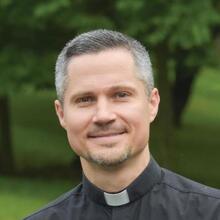Questioning the value of diversity is common in some circles. In 2018, Fox News host Tucker Carlson mocked politicians who celebrated multiculturalism and asked his audience, “How precisely is diversity our strength?” Referring to American society, he queried, “Can you think, for example, of other institutions...in which the less people have in common the more cohesive they are?”
Fortunately, Christian perspectives on diversity are often much more nuanced than Mr. Carlson’s. A better question is: Can we be better at mission and evangelization because of our diversity? The answer is emphatically yes. I know this is true of my own religious community, the Glenmary Home Missioners, and I believe it is true for the entire church. Especially during Black History Month, Catholics should name—and appreciate—the value of diversity in at least three aspects.
First, diversity in my own religious community has improved our cultural sensitivity while we engage in evangelization.
Glenmary is a predominantly white congregation, historically drawing most members from the Northeastern and Midwestern United States. But our focus is on serving in rural, poor, non-Catholic counties in the Southeast and Appalachia by bringing the gifts of the church to areas where they are unfamiliar. One of the early presumptions of our community was that we were Americans who served Americans. Sure, we encountered racial, ethnic and denominational diversity in our missions. But I think it was often assumed, however naïvely, that those differences could be overlooked because of our shared citizenship.
Through the inclusion of assorted instruments, songs and languages, our liturgies reflect our growing diversity while remaining thoroughly Catholic.
This assumption has changed over the past two decades, as our community has attracted members from Mexico, Vietnam, Kenya and Uganda, among other countries. Through the diversity of these members, Glenmarians better comprehend the importance of cultural sensitivity. We now talk about cultural competency, which emphasizes the importance of being more aware of the complexity of culture. We recognize cultural differences that are far deeper than food or language. Our meetings are organized so as to include more voices even while seeking to maintain consensus. We hold listening sessions and strive to understand the nuances of communication. Through the inclusion of assorted instruments, songs and languages, our liturgies reflect our growing diversity while remaining thoroughly Catholic.
These developments have also made us better—though still imperfect—at sharing the Gospel in the mission counties we serve. For example, while on mission, priests in our community adjust their homilies to communicate with diverse demographics. The homilies continue to be theologically rigorous, but they include applications of biblical truths to the everyday experiences of, for instance, seasonal migrants or Appalachian coal workers. Religious brothers also practice a ministry of presence, living among local people and listening to their stories, often before explicitly sharing the Gospel. Moreover, Glenmarians who lead parishes modify devotional practices to meet parishioners’ prayer needs; this may mean incorporating Catholic novenas or special feast celebrations from parishioners’ different countries of origin. More than anything else, we ask questions to help us to know the hearts of the people we encounter.
[Related: How diversity in the classroom makes us better Catholics]
Second, diversity in my religious community has assisted us in standing in solidarity with people of color in order to promote racial justice.
Since our founding in 1939, Glenmary has joined in many efforts for racial justice, including opposition to the Ku Klux Klan. And over the last year or so, with heightening racial tensions in our country, we have witnessed new members in our community—themselves people of color—become leaders in racial solidarity.
At a protest for racial justice in one of our missions in North Carolina, for instance, a Glenmary priest from Kenya led a prayer and provided a message for the nearly all-Black population gathered in the streets. Though his experience as a Black man from Kenya is not equivalent to the Black Southern experience in the shadows of slavery and Jim Crow, he could speak of the racism he has experienced as a person of color living in America.
Without the growing diversity of our community, it is unlikely that we would have been as responsive to racial justice—an essential aspect of the church’s evangelical mission.
A video of that gathering shows the people shouting “Amen” to this priest’s words as he expresses the need for solidarity and calls for racial justice. It was an unprecedented moment in the history of our missionary efforts. But without the growing diversity of our community, it is unlikely that we would have been as responsive to racial justice—an essential aspect of the church’s evangelical mission.
Finally, diversity in our community has strengthened our ability to embrace people on the margins of society.
Being missioners in some of the poorest counties of the United States, Glenmarians are familiar with serving on the margins. Even before the War on Poverty, for instance, our members attended to the neglected regions of Appalachia. Historically, however, few Glenmarians had actually known the despair of abject poverty. No doubt some of us came from families that had to sacrifice to make ends meet. But most did not know the pain of hunger, the loneliness of migrancy or the fear of homelessness.
As the membership of Glenmary increasingly includes populations from the global South, our community has become more intimately aware of and challenged by the ugly and devastating reality of poverty. Hearing these experiences allows us to better hear the cries of the poor, because members of our community have uttered desperate cries themselves. And being sensitized to these cries, we are more likely to walk toward them, heeding the Gospel demand to serve those on the margins of society.
For these reasons and more, diversity has reinforced the Glenmary Home Missioners’ very reason for existence, improving our work of evangelization and mission. And as mission is at the heart of Catholic identity, I am sure a more culturally diverse church translates to more faithful evangelization by all Christians, as well.







